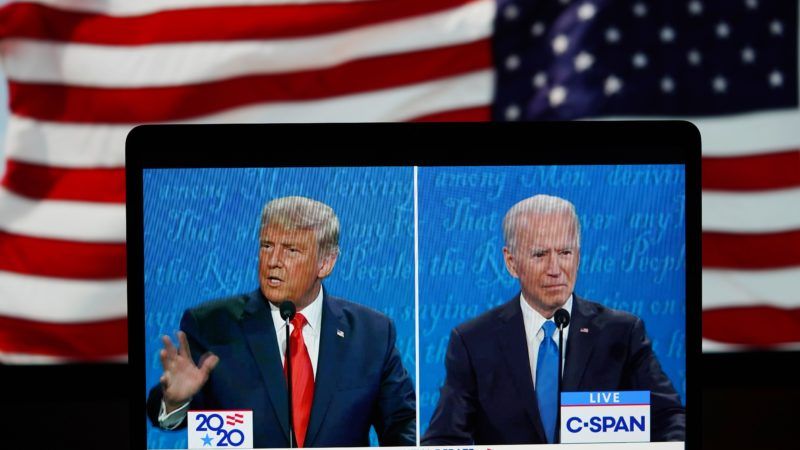Trump, Biden Voters Both Like Government Housing Spending a Lot More Than Housing Development
A new survey from realty company Redfin finds that only 24 percent of Trump supporters and 32 percent of Biden voters support reducing zoning regulations in their neighborhood.

Donald Trump and Joe Biden voters diverge wildly on whether to fund low-income housing programs, but both appear unified in opposing new housing being built near them.
That's according to a survey put out last week by real estate company Redfin, which found that only 24 percent of Trump voters and 32 percent of Biden voters supported zoning policies that allowed denser housing in their neighborhood. That compares to 27 percent of all respondents who said they support denser housing in their neighborhood. The Redfin poll surveyed 3,000 U.S. residents over the second week of October.
"Housing is one of the few types of policies that does not fall neatly into liberal or conservative camps," Redfin chief economist Daryl Fairweather said in a statement on the company's blog. "While many Americans across both major parties can agree that there's a need for more housing—particularly affordable housing—both Democrats and Republicans are reluctant to see their own neighborhoods become more dense."
Subsidizing housing proved much more popular with respondents of all political persuasions.
Nearly 75 percent of Biden voters said they'd support government incentives for low-income housing development compared to 49 percent of Trump supporters and 59 percent of all survey respondents. Some 66 percent of Biden supporters and half of Trump supporters supported government incentives to build housing of any kind. Subsidizing down payments on homes for working-class families was less popular, capturing support from only 61 percent of Biden voters and 43 percent of Trump voters.
The survey comes on the tail end of a presidential campaign that's featured a surprising amount of discussion of housing and zoning policy.
Trump has frequently pitched himself as the defender of the "suburban lifestyle dream" against a would-be Biden administration that Trump says would abolish single-family zoning and force low-income housing (and the resulting urban dysfunction) into tidy, low-density communities.
That's in contrast to his administration's earlier, pre-election efforts to encourage local and state governments to deregulate their housing markets in order to allow for higher-density housing. White House budget proposals have consistently called for cutting or even eliminating federal housing and development grants, although none of those cuts have materialized.
Given the low bipartisan support for denser housing in the Redfin poll, it makes sense that Trump would see the preservation of suburban single-family zoning as a wedge issue to exploit.
Rather than appeal to the nation's NIMBYs ("not in my backyard"), Biden has put forward a housing platform that's surprisingly pro-deregulation in some aspects. The former vice president has endorsed legislation that would require states and localities to loosen zoning codes and repeal restrictions on new housing as a condition of receiving federal housing and transportation funding.
That's an approach some free marketers have cheered on. In other ways, however, Biden is a typical regulate-and-spend progressive. He's promised to beef up regulations on things like mortgage lending and housing appraisals, and massively boost federal spending on aid to homeowners and renters, and on low-income housing construction.
Whatever one thinks of the government housing spending, that money won't go very far so long as the regulations that drive up the costs of new construction remain on the books. The per-unit costs of building new affordable housing in the high-cost, heavily regulated areas of California are already approaching $1 million.
While Biden voters are relatively less opposed to new housing development in their neighborhoods, their NIMBYism is more likely to have an impact. They're more likely to live in deep blue, high-cost, amenity-rich cities and inner suburbs where there's much more demand for higher density housing, and where regulation, therefore, stifles more housing development. Rural Republicans might like apartment buildings less, but it's also less likely anyone would want to build one next to them even if it were allowed.
Previous polls have found higher baseline support for more neighborhood housing development, but a starker partisan divide on the issue.
A 2019 Cato Institute poll found that 59 percent of Americans support more housing in their neighborhood, including 67 percent of Democrats, 57 percent of independents, and 52 percent of Republicans. Another 2019 poll commissioned by the pro-housing development group California YIMBY ("yes in my backyard") found that 61 percent of that state's voters supported more housing development in their neighborhood.
If the Redfin survey is to be believed, however, it suggests that combating the housing shortage in America's most high-cost areas is an uphill battle that requires convincing a lot more voters of the merits of new housing construction.
Rent Free is a weekly newsletter from Christian Britschgi on urbanism and the fight for less regulation, more housing, more property rights, and more freedom in America's cities.


Show Comments (21)